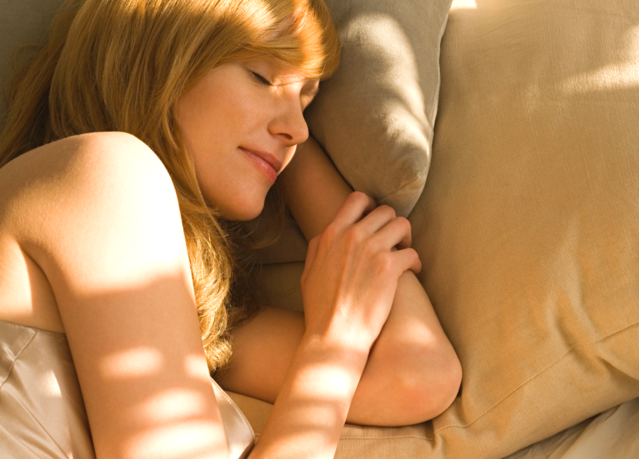Sleep
The Impact Summer Heat Waves Have on Your Sleep
You might not know about what the heat does to your sleep.
Posted August 21, 2019

Most of the United States is just cooling down after a difficult, stifling, sleep-depriving heatwave. About two-thirds of the country was affected by this latest heatwave, which saw temperatures near and above 100 degrees Fahrenheit, and heat indexes even higher. (The heat index measures how the body actually feels, taking into account both heat and humidity.)
This wasn’t the first heatwave of the summer. And it’s not likely to be the last, especially since we’re headed into what are typically the hottest days of the year.
Let’s take a look at how the body handles sleep and heat, and how you can set yourself up to sleep better when temperatures soar.
How heat hurts sleep
Sleep is highly dependent on temperature. Internal body temperatures play a critical role in sleep onset and sleep maintenance—those are scientific terms for our ability to fall asleep and stay asleep. Environmental temperatures—the ambient temperatures in our homes and our surroundings—also affect sleep directly, by interfering with the body’s ability to cool itself down.
Like most of the body’s physiological processes, thermoregulation—the body’s ability to maintain and adjust its core internal temperature—operates according to circadian rhythms, the biological rhythms that drive most of our daily functioning, including sleep-wake cycles. Temperatures fluctuate throughout the day, along with changes to energy levels, and other biological functions such as digestion, metabolism, and immune activity. As we’ve learned in recent years, body temperature also has a significant effect on circadian rhythms. Studies in the past several years have shown that changes to core body temperature transmit strong signals to the circadian clocks that tick away in cells throughout our body.
The most pronounced bio-time temperature shift happens in the latter part of the day and evening, as the body prepares itself for sleep.
Beginning in the late afternoon and extending into night, a number of temperature-related changes occur within the body. The body begins to produce less heat internally. It also begins to push heat to its extremities—the hands and feet, the top of the head. Blood vessels on the skin become larger (a process called vasodilation) in order to release heat. These physiological changes work to lower your core body temperature. In turn, with that reduction in body temperature comes feelings of drowsiness, and eventually, sleep itself. Body temperature stays low throughout the night before beginning to rise in the very early morning hours, helping prepare you to wake up and be active and alert.
Hot temperatures make it harder for the body to shed heat and cool itself. And that poses a number of problems for sleep. Steamy and humid nights cause people to wake more often during the night, reducing sleep efficiency. Sleep efficiency is a measurement of sleep quality, based on the amount of time you spend in bed compared to the amount of time you spend actually sleeping. A solid sleep efficiency score is 85 percent—that means of the 100 percent of the time you spend in bed, 85 percent is spent sleeping. Really good sleepers cross the 90 percent threshold. Even for good sleepers, it’s harder to maintain a strong sleep efficiency when it’s hot out. Research shows different insomnia symptoms—both difficulties falling asleep, and difficulty staying asleep, become more common in hot weather.
Steamy temperatures also diminish the time spent in slow-wave sleep and REM sleep. These sleep stages are when the body does critical work to rejuvenate and restore itself, from repairing cells and strengthening its immune system to processing memory emotions. Exposure to very warm and humid ambient temperatures can deprive your body of these highly restorative, beneficial sleep stages.
It doesn’t take a record-breaking heat-wave to experience these negative effects on sleep. Research shows that even mild heat exposure can keep body temperatures higher, alter time spent in sleep stages, and make it harder to fall asleep and stay asleep.
We face other costs from the sleeplessness that a heatwave brings. Excessive heat and humidity raise the risks for heat-related illnesses, including sunburn, heat rash, heat exhaustion, and heat-stroke. New research shows that sleep deprivation can lead to changes in our perception of the symptoms of heat-related illnesses. When we’re tired, we’re likely to experience the discomfort, disorientation, stress, and pain of heat sickness more acutely.
The combination of sleep deprivation and high ambient temperatures also can affect our cognitive performance, particularly our focus and attention, as a recent study of shift workers demonstrates. Sleeplessness is well understood to interfere with a whole range of our cognitive function, from learning, to memory, to decision making and the processing of emotions. Combine lack of sleep with days of hot, humid weather—when even nights don’t cool down enough to get some real relief—and it’s no surprise we don’t feel or perform at our best.
Next week I will further discuss how sleep can impact your sleep and 7 things you can do about it!
Sweet Dreams,
Michael J. Breus, Ph.D., DABSM




